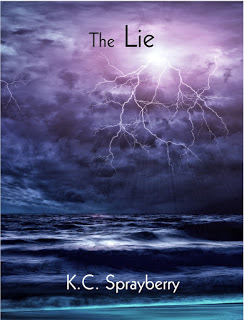K.C. Sprayberry's Blog, page 137
January 18, 2017
Repetition
Repeating actions and words seems like a lot of fun. It worked the first time so it should work again.
Right?
Wrong…
You have given the reader a memorable moment. Let it go, as that ear worm of a song tells us repetitively. Don’t repeat that throughout the book whenever you’re stuck for a phrase or description.
Move on, in other words. Figure out new descriptions. Discover a new phrase that totally rocks. Whatever you do, do not repeat that great phrase. It just won’t work, especially if you keep using it over and over again.
Authors are artists—our craft is working with words, bending them to meet our expectations and turning a dull tale of two people meeting on the street into a classic story of good versus evil. What we cannot do is cheat our readers and by using repetition that is exactly what we’re doing.
We’re being lazy. It’s too hard to figure out a new description so we’re going to put in an old one. It worked before, so it should work now.
We have two characters with nearly the same name. Why not make them look alike? If my editor gripes about that, I’ll throw in a POW moment—they’re identical twins separated at birth.
Before you attempt this old hack, might I strongly suggest a bit of research on the subject of identical twins separated at birth. You will find that’s more work than it’s worth. You will have to go back and actually set up this scenario, from the beginning of your novel.
Ah, you argue, I’ll make them a doppelganger. That’ll take care of that twin thing.
Oh, I say. Then you’re going to make one of these look alikes good and the other evil. You did look up what doppelgangermeans. Right?
By now, you’re frustrated and ready to throw an editing pen at me. Go ahead. I’m doing my job. Making you think, and you’re seeing that your attempt to be lazy isn’t working.
One thing authors aren’t is lazy. We craft extremely complex stories. This means that we need to also craft individual descriptions and avoid repetition.
Published on January 18, 2017 00:00
January 17, 2017
Ghost Flight
Welcome to #TuesdayBookBlog for 2017…

Service to one’s country is the greatest thing any man or woman can give. Attempting to sabotage the aircraft or other equipment will only serve to cause problems…
Get Ghost Flight on Amazon
Nothing can stop the U.S. Air Force… except a series of inexplicable incidents with the F-16 fighter jets assigned to Luke AFB in 1988.
Staff Sergeant Kayla Watkins believes she’s found the answer to the incidents that have taken the lives of two dozen hot pilots. Nightly, she watches the march of those dead pilots, once again promising to find answers.
Technical Sergeant Trent Montrose gets the surprise of his life after the last crash, the morning of a planned inspection from higher headquarters. Ghost Flight marches past to him on their way to the flightline.
Office of Special Investigations undercover operative, Captain Jake Arnold, loathes his operation within the 58TTW with a “dream team” of non-coms whose sabotage is suspected to go all the way back to the waning days of the Vietnam conflict.
Romance, suspense, a base on the edge. The Arizona desert is harsh and unforgiving, as harsh and unforgiving as an aircraft unable to perform up to standards. Kayla, Derek, and Jake become a team dedicated to stopping the saboteurs before another good pilot dies.
Early in 1988, the young pilot completed his pre-flight check. The weather was certainly strange this time of year. April’s days scorched the life right out of a man, while the nights cooled to the point where he had to wear a flight jacket until he boarded his aircraft.
He did all he could do from the ground and nodded at the crew chief, one TSgt. Montrose. The man looked a bit old for this job and his rank, almost as if he was ready to retire, and he moved stiffly, as if his muscles bothered him. Yet, Captain Stover didn’t comment on that. His uncle had been a veteran of Vietnam, flying F-4 Phantom in missions over a countryside where he often couldn’t tell who was friend and who was foe. Having grown up on stories of young men testing their mettle in those aircraft, he’d joined the Air Force and signed on to become a pilot in time to be assigned a seat in the coveted F-16 Fighting Falcon.
“Fair skies, sir,” TSgt. Montrose saluted the captain. “May your wings fly true and bring you back safely.”
That was a saying his uncle had told him about, from ‘Nam. The captain stared at the non-com curiously.
Published on January 17, 2017 00:00
January 16, 2017
Non-Words
Just what are non-words?
I’m sure you’ve seen them, mostly used in dialogue. If you’re like me, you’ll even recognize a few that slip out of your mouth when you’re talking. We’re so interested in not sounding the fool by not having an immediate response that we have a stable of words we use to cover that awkward silence sure to happen while we search for the right thing to say.
Oh yes, all of us are guilty of not letting the silence hang. We can feel those intense gazes on us as we attempt to come up with a witty response to a question or correct someone’s statement, if only we can find the right word.
What we’ll do to keep from looking foolish is toss out a non-word to keep the momentum going. Words such as well, so, and now fall into this category. Unfortunately, not only are these words used in face to face encounters, but they are creeping into books.
It’s not unusual to have every character start a sentence with “So…” “Now…” or “Well…” I often ask myself while editing out this issue if the author realizes their own speech patterns have taken over, so every character sounds like the same person.
What? Yeah, this is probably your response at this point.
All I have to say is that you heard me. Rather, I did write that correctly.
Individuals have begun to insert their own speech patterns into the dialogue of all of their characters. Lately, it’s not unusual to have an entire conversation where the multitude of characters all stat their sentences with the same word and get on with “telling” the reader how things are going.
What has happened at this point is that you’ve lost the sense of each character’s personality and you’re telling. Not really a great thing.
How do you avoid this?
Some authors have been blessed (I swear it’s more of a curse) with the ability to hear their characters conversing in their head. We can sense the differences in their speech patterns and know how to word their sentences. That’s more than likely because those characters are a rough bunch, never giving the poor author an even break.
If you don’t have this blessing (it really is a curse), you need to rely on your stellar editing skills to clean up those areas where you’ve faltered, or hope your beta readers locate all the problems and mention them to you.
Identifying and correcting the problem is the first milestone you’ll hurtle over. Your next one is to keep those characters from hitting you with that “curse” where they’re in your head, directing everything.
Published on January 16, 2017 00:00
January 15, 2017
Go Away

The 2017 Everybody YA #SundayBookBlog continues with more fun, excitement, and tension!

We all have siblings who drive us insane. Isn’t that part of growing up? And we’ve all told them to go away forever. What if that really happened?

Get Go Away on Amazon!
Lainie’s older stepbrother, Mark, is the bane of her existence. He always embarrasses her. She swears she hates him… until a terrible day when she realizes just the opposite is true.

Glancing in all directions, I sneak toward where I live. He can’t see me. I can’t let him know that I’m home. Not until I’m safely inside.
“Hey, Lainie! Do your friends know that you dance in front of the bathroom mirror every night? Maybe I should sell tickets.”
Face burning, I duck my head, running up the stairs and the last few feet to our apartment. How can my jerk of a brother do this? Turning, I stand in front of the door and scream out my frustration.
“Mark, I don’t want you to live here anymore. You should stay at your dad’s this year. Like in never come back!”
Shutting the door with a loud bang, I head for my room. A slam and a bang tells me that Mark didn’t waste any time coming after me. He’s so lame. How can I ever live down this shame? Thank goodness, he’s leaving in a few days. Who would ever believe he’s my older brother? He acts more like he’s two.
Published on January 15, 2017 00:00
January 11, 2017
Too Much Exposition
We are authors, therefore we love to write. In fact, if given a chance, we will not stop no matter how much we are tempted to do so.
Basically, there are times when we are driven to keep on writing. Our paragraphs last for several pages. Chapters can be well over thirty or forty pages. Sentences are prosaic and beautifully crafted. Nothing will stop us in our quest to have the most important novel of the year… the century if truth be told.
Here are a couple of questions you need to consider as you pound out those carefully crafted sentences and paragraphs.
Who is going to read them?
Yes, I did ask that. Do you have an answer? Have you written sentences so long that the person attempting to understand what you’re saying was lost in the third line and didn’t remember how it began? Is your paragraph filled with exposition so extensive that someone just closed your book and demanded a refund?
Can you understand your own work?
Here’s a biggie. Because if you can’t understand what you’ve written, how can you expect a reader to understand it? Please, don’t tell me that understanding will come at some point further down the road, after I’ve struggled through four or five hundred more pages of your tome. You will hear the one thing no author wants to hear…
I quit back on page twenty and I will not be going back. Not even the most intelligent person on the planet can understand your book.
Once upon a time, literary masterpieces were expected of authors. That was back in the bad old days when authors might turn out one book in their lifetime. This is the twenty-first century, where we authors have to publish several times a year or perish under the burden of thousands of authors a week uploading their work to sales venues.
Here’s a hint for the future. Put away that book you’re working on for a few months. Start on a new project. Try a short story. Those are great teaching tools for getting action, description, dialogue, and narrative into a well-rounded story in a limited number of words. Short stories are actually making a comeback, not in the magazine market but as a standalone. People with smart phones can download one and be reading these while commuting or standing in line. They’re great for a quick lunchtime read.
Now that you’ve mastered the short story, go back to your literary classic and edit away. Clear out the chaff and see what you have left.
Goodness, looks like you found the story.
Published on January 11, 2017 00:00
January 10, 2017
The Pond
Welcome to #TuesdayBookBlog for 2017…

Horror comes in all shapes and sizes. There is the slash and gore variety, so popular for many years. Then there is the psychological horror, of discovering a situation that chills your blood and makes you wonder who you can trust…
Get The Pond on Amazon!
Anne-Marie gets the surprise of her life, on the eve of passing over her duties as the Seer of Wallis County, Georgia. The pond where she and her friends have skinny dipped for years begins spewing out ghosts, all demanding that she bring to light the terrible events that have been hidden beneath the watery surface. What’s worse than ghosts demanding assistance just when she’s ready to shake the dust of this area off her feet? The owner of The Pond, or rather a member of his family, who happens to be the sheriff. Can Anne-Marie uncover all the secrets of The Pond, or will she be stuck in this county forever?
Beneath the murky depths of the pond, a great stirring was beginning. Those who had inhabited this waterway, some for more than a century, others for less than ten years, were awakening.
She is here.
Our salvation is at hand.
Call her… call her.
The great secret that had been a part of Wallis County for so long was about to be revealed. No one would escape the implications of murder most foul or hiding those who had perished either through natural means or “misadventure.” Unanswered questions of a few would soon have resolutions that would turn neighbor against neighbor and render families apart as they defended the people behind the great secret.
Find her.
She is here.
Where?
At the pond.
Why?
We must discover that.
Published on January 10, 2017 02:46
January 8, 2017
Telling versus Showing
We’ve all heard it since we first decided to become an author. You must always show and never tell in your story. Now comes the question.
Just what is telling and what is showing?
Many people will tell you that telling is using “to be” verbs and you must avoid those at all costs. I’ve had others claim anything that’s narrative is telling so you have to stick with dialogue and use vocal or action tags to get any narrative into the book. (Believe me, that is beyond wrong). Still others have no clue about the difference between telling and showing.
It’s really hard to explain telling and showing without examples. You can give lessons on this is telling and this is showing, but many people don’t understand. Or you can be confronted with the author who swears they have to lead the reader by the nose and tell them every single nuance they must feel at a certain point in order for them to understand the story.
First, leading a reader on is being snobbish. You think you’re better than they are and therefore must explain everything. Stop that right now. Readers are intelligent. They can read a description or glance through an action scene and understand every single word. They will have an image in their head they’ve created through your magnificent showing. There is no need to take their hand and say, “Now, this is why all of this has happened. Just so you’re not lost in the next section, I’m going to give you a big clue about what’s coming up.”
Imagine how you’d feel if someone did that to you.
Yeah. Doesn’t feel very nice, does it?
Now that we have that out of the way, let’s look at another way to show rather than tell a scene. This is one of my biggest issues with editing, seeing information dumped into a section in such a way that I’m bored by the end of the first sentence.
Telling:
The house sat on a corner near the middle of Small Town, USA. It was a ranch style home, split level. The lawn showed the ravages of the too hot summer, with the grass wilting beneath a blazing sun or burned away completely. The end of the driveway mailbox’s red handle, the one used to indicated to the postperson that a letter was awaiting pickup, hung at a crooked angle. Traversing the walkway from the driveway to the door would be miraculous without breaking your neck, if you were so inclined to attempt stepping on those cracked and shattered paving stones. Once on the porch, a person would have to duck beneath the sagging roof and tiptoe past the warped boards in order to press the doorbell button, which hadn’t worked for years. In exasperation, this individual would be forced to beat on a door that rattled as if it was about to fall in and allow them entrance to a house they’d already decided was going to be far worse than its exterior.
Ready to give up on this book yet? I sure am, and I wrote that drivel. Let’s try that again.
Showing:
“Damn GPS.” She pounded on the dashboard, hoping she was right and the computerized map was wrong. “This can’t be Lila’s house.”
A glance at the faded address painted on the curb brought out a frustrated sigh.
“Just how bad are things for her?”
Parking in front of a mailbox, Cindy got out of her car and stared in shock at the crooked pole and listing red flag. Part of her mind registered how the grass not only needed mowing, but a few nights of running a sprinkler would really improve its appearance.
“Why didn’t she call me earlier?”
Cindy strode up the cracked driveway and gingerly stepped onto the buckling path to the porch. She kept her gaze on the ground, to be certain she didn’t fall flat on her face. Once her foot was on the steps, she grabbed the rickety railing and stared in horror at the porch’s roof, mere inches above her head.
“Lila had better have a great explanation for this.”
Two steps later, after tripping over a loose plank, Cindy pressed the doorbell. She couldn’t hear a thing and steadily jabbed her finger again and again.
“Oh, come on, Lila.” Cindy beat on the door. “Open up.”
See the difference. Instead of a boring description where the reader is led through the home’s exterior, we have action. We have a person experiencing the moment. Mostly, we have showing the reader what the outside of the house looks like rather than telling them about it.
This type of description will grab a reader’s attention and keep it on the story. There is a rule for authors we all must follow if we want to succeed.
Trust your reader.
Published on January 08, 2017 23:50
The Lie

The 2017 Everybody YA #SundayBookBlog continues with more fun, excitement, and tension!

One little lie was all she told. Or actually, didn’t tell. Amy just didn’t mention the wild and crazy plan her bestie cooked up. There were consequences. Aren’t there always?

Get The Lie on Amazon!
For high school siblings, Amy and Bryce, the night began with a football game. Bryce was stuck at home with a cold, brought on by an uncaring coach. Amy was in the stands, playing with the band whose funding had been taken away and given to the football team.
Her best friend, Jane, brought the band together to play a prank on the team in protest.
The prank went wrong. Horribly, tragically wrong.
And the lie that started it all would not stop.

I hear Amy coming home. She doesn’t know that I’ve been awake all night, waiting on her. Not that she sneaks out much—she never does stuff like this, unless it’s a Jane plan. I pretty much figured that from what I caught of the muffled phone conversations going on until eight last night. That’s when I heard the window going up, a box being hidden behind the bush, and Amy sneaking away.
She’s lucky that Mom and Dad didn’t catch her. Thanks to me. If I hadn’t gone into the kitchen, faking that cough, Amy would have been in major trouble.
That fake coughing will have earned me another day off school, once Mom sees me this morning. She’s a total overprotective mom when it comes to our health. Big deal that I had asthma as a kid, even had to carry an inhaler that I lost whenever I could. I’m way past that now. The cough is what’s left of the cold I got doing sprints in a driving cold rain last Friday night, after we once again lost a football game.
At least I won’t have to do that tonight. Someone has to deal with Coach Williams. He’s totally out of control lately.
Published on January 08, 2017 00:00
January 4, 2017
Overly Dramatic Action
The action is heating up. You’re really into writing your novel. In fact, you’re so caught up by the elements that you’re going over each word you use, describing every little nuance, and going back to make sure you didn’t miss anything.
Sound familiar? Are you in the throes of that right now? How’s that action coming? Tense enough? Is the flow good? Are you writing an overly dramatic scene? Will your work soon be or already is so involved and detailed that no one except you will be interested in it?
Of course this sounds familiar. We’ve all done it at one point or another. We’ll pour over a scene, unable to move forward until every detail is right.
The action is coming along very well, you respond. I’ve spent days and weeks getting it just right. It is the best scene I’ve ever written. So, yes, it’s tense enough. The flow is marvelous.
Step back from the screen. Put that baby away right now. Wait a week and read your work again. You will now be able to answer the last question truthfully.
Has your work become so involved and detailed that no one except you will be interested in it?
This is what we call an overly dramatic action. You’ve lost the thread of the plot and made the tense moment become the definition of your book. Your reader abandoned this book fifteen paragraphs back because they were lost and confused.
What’s the cure for overly dramatic action?
Take a break. Work on something else. Go for a run around the block several times. Shop with friends. Do anything that will allow you to clear your mind of this scene and then look at it with a fresh perspective.
That’s when you get out the editing pen and clear out the extraneous and unnecessary action. Yes, action must be defined but not overly so. In a fight, we don’t need to see every fist thrown by all the characters involved. A car wreck doesn’t need each character in the vehicle to be described down to the minute detail of someone’s sunglasses ending up on their forehead or that streak or red lipstick going from the corner of their lip to their nose. All we need to see and feel is what your main character is experiencing.
Remember this—during tense scenes, your main character will be focused on one thing. They will be struggling through a tough moment. Their attention should be focused on themselves, on their survival. This means that every element within a fifty or hundred foot radius isn’t necessary to detail. All you should be concerned with is what is right in front of your character’s face.
Published on January 04, 2017 00:00
January 3, 2017
Darkness Within
Welcome to #TuesdayBookBlog for 2017…

All of us have a darkness within ourselves, an urge to step back and let others take control, or to push our way of doing things on others. How do you handle your darkenss?
Get Darkness Within from Amazon!
There lies in all of us darkness, an evil core which may hinder our decisions. How we deal with that darkness is what defines us as human—or not.
Herm has been the protector of the forest for many years. He now has the duty to choose his successor—and his three candidates all personify the statement he greets them with. A braggart, a self-proclaimed coward, and a woman who seems unable to understand her position. How can Herm select a new protector with such a terrible collection of individuals?
“It is your time, Herm. Your moment to choose a successor. You may not waver, nor may you consider our decision a mere suggestion.”
The voice came from within and without the forest. Herm bowed to the decision of the elders that had been presented to him. Granted, he’d brought up this issue himself and had been overseeing the cycle of replacement for many weeks on end. But there truly was no qualified male that he’d yet to see capable of doing as he’d done for these many years.
“You must look upon all the candidates with equal consideration,” a female voice commanded him. “It’s time to stop thinking that women aren’t capable of doing the duty you’ve shouldered all this time. Didn’t I do well in my tenure in your position?”
Shame flushed him. The greatest of the Elders was a woman. She’d picked him for his duty, yet he still felt it was a man’s job, one too difficult for nearly all women on Earth.
“Do you understand?” a third voice asked.
“I do.” Herm nodded. “And I shall obey.”
Published on January 03, 2017 00:00



